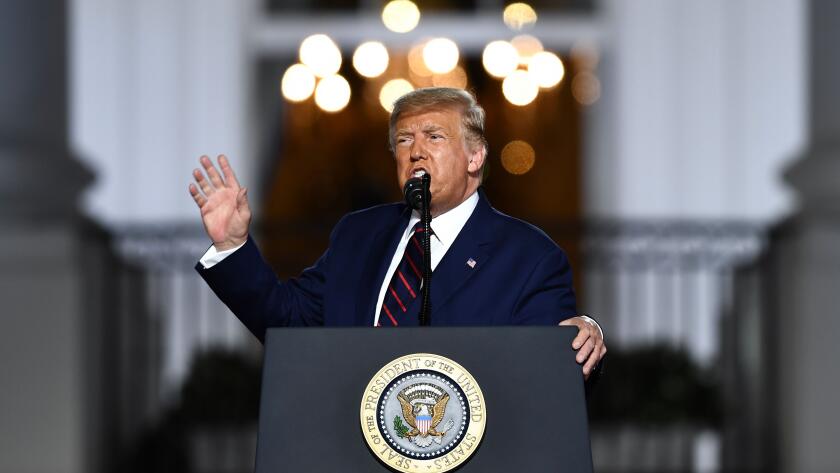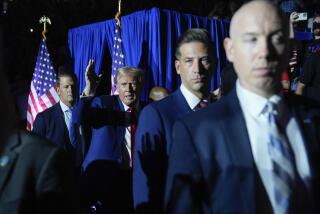Trump accepts Republican nomination with blistering, often false attacks on Biden
President Trump accepted the Republican nomination Thursday night before a large crowd on the White House South Lawn, casting himself as an insurgent rather than an incumbent and his first-term record as a resounding success.
WASHINGTON — President Trump accepted the Republican nomination Thursday night before a packed crowd on the White House South Lawn, delivering a storm of angry broadsides and false charges against Democratic nominee Joe Biden as he sought to reframe the November election as a choice rather than a referendum on his first term.
With the country gripped by a deadly pandemic, a deep recession and racial unrest, Trump capped the four-day Republican National Convention by offering an opaque agenda for a second term, focusing instead on savaging Biden by name 41 separate times as hundreds of socially undistanced supporters repeatedly stood and cheered.
Accusing his opponent of “catastrophic betrayals and blunders,” Trump warned of “left-wing anarchy and mayhem” if the Democrats retake the White House even as he stoked fears of the widespread protests this summer over systemic racism and police abuses.
“At no time before have voters faced a clearer choice between two parties, two visions, two philosophies, or two agendas,” Trump said, mocking Biden’s claim that the race is about the soul of America.
“Joe Biden is not a savior of America’s soul,” Trump said. “He is the destroyer of America’s jobs. And if given the chance, he would be the destroyer of American greatness.”
Leveraging all the trappings of the presidency for partisan purposes, Trump violated a political tradition — and possibly federal law — honored by every previous president.
Defying long-standing norms about using the White House for partisan events and his administration’s own guidelines about avoiding large gatherings during the coronavirus crisis, Trump addressed more than 1,500 supporters — a crowd only slightly larger than the number of Americans who died of COVID-19 on Wednesday — packed together in narrow rows of chairs across the South Lawn.
With nearly the entire country still partly locked down from the pandemic, the images of the mostly mask-less throng and fireworks spelling out Trump’s name during a grand finale on the National Mall underscored the president’s coronavirus denialism and his stubborn refusal to heed public health experts and ethicists alike.
In a meandering, repetitious speech that lasted more than 70 minutes, Trump worked hard to sell his domestic and foreign policy record and made an extraordinary pitch for Black voters who have largely shunned his racially charged rhetoric and policies.
“I say very modestly that I have done more for the African American community than any president since Abraham Lincoln, our first Republican president,” Trump said, one of multiple falsehoods in his speech.
But he also stoked the fears of white voters, claiming that Democrats “will demolish the suburbs” and that Biden would defund law enforcement — something Biden has repeatedly said he opposes — while simultaneously attacking him for supporting a 1994 crime bill that beefed up America’s police departments and led to a rise in incarceration.
Just as incongruously, he portrayed Biden as both a pillar of the Washington establishment, repeatedly citing his “47 years” in national politics, and a captive of the party’s left wing, including Vermont Sen. Bernie Sanders.
“Joe Biden is weak,” Trump said. “He takes his marching orders from liberal hypocrites who drive their cities into the ground while fleeing far from the scene of the wreckage.”
With his campaign trailing in polls, Trump mixed grievance-laden appeals to his base with optimistic rhetoric aimed at winning back wavering Republicans and swing voters.
He sought to separate his administration’s accomplishments from his polarizing personality and to convince a fractious, nerve-jangled country that his presidency has succeeded. But the Trump campaign’s new slogan tacitly acknowledges the need for a do-over: “Make America Great Again. Again.”
The speakers ahead of Trump largely highlighted scary stories about rampaging mobs, and ignored the pandemic that has killed more than 180,000 Americans and put up to 30 million Americans out of work.
Several senior members of Congress shared the evening’s undercard, including Senate Majority Leader Mitch McConnell (R-Ky.), Sen. Tom Cotton (R-Ark.) and House Minority Leader Kevin McCarthy (R-Bakersfield).
But those willing to shower Trump with unadulterated praise got the most time, including Dan Scavino, his social media director, and Dana White, the CEO of Ultimate Fighting Championship.
And Ivanka Trump, the president’s daughter and advisor, worked the hardest to rehabilitate her father’s image, offering anecdotes about his warmth behind the scenes even as she acknowledged his sometimes-incendiary tweets.
“I recognize that my dad’s communication style is not to everyone’s taste,” she said. “And I know his tweets can feel a bit unfiltered. But the results speak for themselves.”
Trump took the stage hours after Hurricane Laura hit parts of Louisiana and eastern Texas, leaving at least four dead and widespread damage. None of the speakers this week acknowledged the growing danger of human-caused global warming, a phenomenon that Trump has dismissed.
The convention overlapped with protests and scattered vandalism in Kenosha, Wis., after police there shot Jacob Blake, a Black man, seven times at close range in front of his children. A 17-year-old from Illinois was charged with shooting and killing two of the protesters with an assault-style rifle.
Although the protests erupted on Trump’s watch, the speakers uniformly blamed Democrats, warning that Biden would make the country less safe.
“You can have four more years of President Trump,” said Patrick Lynch, president of New York City’s police union, “or you can have no safety, no justice, no peace.”
Ann Dorn, the widow of a retired St. Louis police captain who was killed during an outbreak of vandalism in the city, provided the emotional core of the night’s program. Ann is white; her late husband, David, was Black.
“Violence and destruction are not legitimate forms of protest,” she said as a single tear trickled down her left cheek. “They do not safeguard Black lives. They destroy them.”
Supporters on the South Lawn responded with applause, but Dorn’s appearance was controversial within her own family. David’s daughters told the St. Louis American, a Black newspaper, that their father opposed Trump and wouldn’t want his widow speaking at the convention.
And in a fiery, high-volume speech, Rudolph W. Giuliani, the former New York mayor and the president’s personal attorney, railed about rampant crime. But his concluding call to action — “Mr. President, make our nation safe again!” — served as a reminder that any unrest in America is happening on Trump’s watch.
Kellyanne Conway, a counselor to the president, was blunt during a TV interview Thursday morning, explaining that Trump and his campaign view the protests as politically advantageous.
“The more chaos and anarchy and vandalism and violence reigns, the better it is for the very clear choice on who’s best on public safety, and law and order,” she said.
Biden, in his first public appearance of the week, blamed Trump for inciting violence and provoking more protests by sending armed troops into cities.
“He just keeps pouring fuel on the fire. He’s encouraging this. He’s not diminishing it at all,” Biden said on MSNBC, rejecting Vice President Mike Pence’s claim in his acceptance speech that people “won’t be safe in Joe Biden’s America.”
“This happens to be Donald Trump’s America. Donald Trump’s America,” Biden said. “The biggest safety issue is all the people dying from COVID. We’re worse off than any other country in the world.”
After lying low for the first three days of the RNC, Biden made two TV appearances, on MSNBC and then CNN, both arranged only Thursday morning. It reflected growing concern by Democrats that Trump’s messaging barrage could be registering with swing voters, especially on the question of protests and policing.
While RNC speakers sought to brand Black Lives Matter protests as violent mobs of anarchists, the GOP continued a sustained pitch this week to Black voters, pointing to Trump’s enactment of criminal justice reform and his economic stewardship prior to the pandemic.
Ja’Ron Smith, a deputy assistant to the president and the only Black official in the West Wing, spoke about how Trump comforted the loved ones of Black victims killed by police.
“Every issue important to Black communities has been a priority to him,” Smith said. “I just wish everyone could see the deep empathy he has shown to families whose loved ones have been killed in violence.”
More to Read
Get the L.A. Times Politics newsletter
Deeply reported insights into legislation, politics and policy from Sacramento, Washington and beyond. In your inbox three times per week.
You may occasionally receive promotional content from the Los Angeles Times.














